17 April 2023 by bobhud
Passer les cols: Personal Reflections on the Career of an Exemplary Mentor, Jean-Claude Carron
Bob Hudson, Editor-in-Chief
Brigham Young University
Whenever, at an academic conference, over post-session drinks or a meal, colleagues engage in that timeworn ritual of commiserating over the unworkable eccentricities, sadistic cruelty, emotional – if not physical – unavailability, etc., of their dissertation advisors, I always have a moment of unvoiced, internal gratitude that mine was nothing like that at all. Indeed, Jean-Claude Carron was the ideal mentor in all ways imaginable: kind, engaged, encouraging, soft-spoken but clear in his demands, thorough, an advocate for his students at conferences, a willing reader (even over the first few years into the profession) – in short, he was entirely exemplary.
The same could be said of his career, which several of us, his students and colleagues, aim to celebrate through the current festschrift. By way of introduction to this volume, Renovatio, Recettes, Renaissances: Essays in Honor of Jean-Claude Carron, I decided the best way to open the conversation, so to speak, would be in reviewing certain elements from his career, presented under a personal light, to construct a rounded view of the individual these pages seek to venerate.
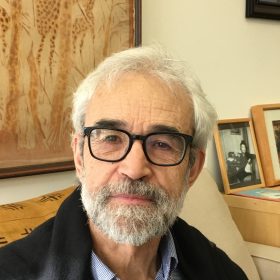
Jean-Claude Carron, official UCLA portrait
From the small Alpine village of Orsières, Switzerland, in the Valais, which is one of the historical few Swiss cantons to resist the Protestant Reformation and remain faithful to Roman Catholicism, Jean-Claude lights up at the mention of his rustic, romantic homeland. After all, his father was a guide de haute montagne (personally, I feel a lot is lost by dropping the adjective “haute” in the English equivalent “mountain guide”). To provide an idea of the terrain of his youth, Jean-Claude once explained that his father mostly worked at the famous ski resort of Verbier, some 2 km to the northeast as the crow flies and visible from the high points of Orsières on a clear day – but, requiring six hours(!) on foot due to the peaks and valleys of the district of Entremont (etymologically “between mountains”) to be traversed to get there. Decidedly, Orsières is nestled between the Grand-Saint-Bernard Pass and the Val Ferret, at the geographical corner where France, Italy and Switzerland meet; and, looking at a map, one finds it amid mythical names such as the Grand Combin, Mont Vélan, the Grand Golliat, Dolent, Tour Noir, Aiguille d’Argentière, Catogne, etc. A famous adage holds that if you scratch a theory, you’ll discover an autobiography. Granted, Jean-Claude is neither a theorist nor a maître à penser; still, I believe this idea applies in his case: Forever resisting the insularity offered him at birth, Jean-Claude has climbed the peaks around him and from there observed Geneva, France, his near neighbor Italy and, if you really squint, Germany as well. All the while, he has remained rooted in his Swiss upbringing. A guide for many seeking to scale the same perilous faces in academia, in calmer times, as a true gastronome, he also researched, tested, perfected and shared recipes he gathered across his travels – not the least of which was the recipe for how to live and enjoy life.
Before moving on to Jean-Claude’s adventures à travers les cols, I would be highly remiss not to share a truly remarkable anecdote: As a young child, at the end of WWII, Jean-Claude would once be left with a babysitter, alongside an American girl, born in England of a GI soldier and a Swiss mother, also from Orsières, who was waiting to join her husband who had returned to the US at the end of his active duty. Her name was Jacqueline Pavlich, and neither he nor she held any memory of this early meeting, when they met and fell in love some twenty-seven years later in Geneva, where he was a university student and she was dancing and teaching ballet – but Jean-Claude’s mother certainly remembered when he brought her home to meet his family! Jacqueline, of whom I will say more below, would be the love of Jean-Claude’s life.
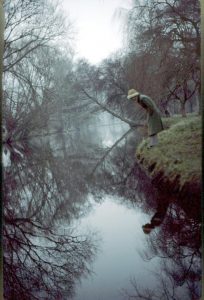
Jacqueline Pavlich, Oxford, 1975
(J.-C. Carron personal collection)
My co-editor and colleague at Brigham Young University Chris Flood (also Jean-Claude’s student at UCLA) and I both feel a great sense of pride in the fact that our intellectual genealogy comes through the University of Geneva. In conversation, we both realized that, at separate times, we have stood gazing at the sculptures of Farel, Calvin, Bèze and Knox on the Mur des Réformateurs in the Parc des Bastions in Geneva only to be overcome by the feeling of the immensity of the Faculté des lettres behind us. Of course, that is where Jean-Claude studied, after having received his Maturité (the Swiss equivalent of the Baccalauréat) at the Collège-Lycée de Saint-Maurice in the Valais and completing his Italian education at the Università per Stranieri in Perugia. The names alone of those Jean-Claude worked under in Geneva are simply incredible: Jean Starobinski directed his License in 1972 and Michel Jeanneret his Doctorat in 1981! Additionally, Roger Dragonetti taught him medieval studies, lecturing in Albert Thibaudet’s aula. Another of Thibaudet’s students Jean Rousset, the literary critic and specialist in Baroque studies, was his professor and guide on a study trip to Rome. Henri Morier taught him writing, rhetoric and poetry. Jean-Claude’s Livret d’étudiant also includes the signatures of Yves Bonnefoy and Roland Barthes, both guest teachers at the Collège Calvin. And, like many students in Lettres, he used to audit Jean Piaget’s main ex-cathedra course in the Bastions amphitheater. Given the fact that Chris is a specialist on the French Reformation and Wars of Religion and my own research is situated in the anthropo-literary field of Kinship Studies, the gravity of our “pedigree” is far from lost on us. Neither is it so with Jean-Claude. When both of his directors died in 2019, it was Jean-Claude who organized events to honor the memory of each, with a special session at MLA 2020 Seattle “La beauté du monde: Hommage à Jean Starobinski” and a UCLA Center for Medieval and Renaissance Studies symposium “Homage to Michel Jeanneret” in Oct. 2020.
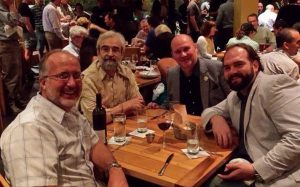
Cochon Restaurant, New Orleans, LA, SCSC 2014, 17 October 2014;
l-r: Bruce Hayes, Jean-Claude Carron, Chris Flood, Bob Hudson (personal photo)
While his studies included teaching opportunities in Milan (1972–74) and at Oxford (1974–77), Jean-Claude found his permanent academic home in 1979 at UCLA. He and Jacqueline, who also found employment in Los Angeles, teaching ballet and theoretical/performative dance courses at USC, and choreography in her own private ballet school, purchased a charming bungalow near the original LA Farmer’s Market, LACMA and the La Brea Tar Pits. (As a personal anecdote, I always loved that the door leading from their driveway to the kitchen had a blue “Entrée des artistes” placard affixed above it, which is also why, with Jacqueline – a true artist – living there, I always felt obligated to enter through the front door.)
At UCLA, Jean-Claude’s exemplary academic career began. In 1986, he developed his doctoral dissertation into a monograph, Discours sur l’errance amoureuse: une lecture du canzoniere de Pontus de Tyard (Paris: Librairie Philosophique J. Vrin), a book that remains a standard for Tyard Studies. (In fact, when I participated in a conference celebrating the 500th anniversary of Tyard’s birth at his own castle in Bissy-sur-Fley in 2021, the hosts and organizers were all very cordial and welcoming; however, when they discovered that I had been the student of Jean-Claude Carron, they nearly rolled out a red carpet!) The well-roundedness, symmetry and balance of Jean-Claude’s career are clear in his other published books: an edited collection, a critical translation and a critical edition. The first of these, François Rabelais: Critical Assessments (Johns Hopkins UP, 1995) was born of a now-famous 1991 symposium organized by Jean-Claude at UCLA in 1991. Its three sections, with the very Rabelaisian divisions of “Bones of Contention,” “Marrows of Discontent” and “Médullaires,” featured articles by the likes of Terence Cave, Gérard Defaux, François Rigolot (who also contributed to the current collection), Thomas Greene, Edwin Duval and, of course, Carla Freccero, who related the contemporary Clarence Thomas hearings to the field of Rabelais Studies. Mentioned in at least three essays in the present volume, this edited work immediately became a standard in the field. In 2012, Jean-Claude would edit and co-translate Le cuisinier françois of Pierre de La Varenne into Italian as Il Cuciniere francioso (Milan: Edizioni Guido Tommasi), a reflection of his long-time research interest in early modern cookbooks and recipes. Returning to Tyard in the twilight of his career, in 2019, Jean-Claude published a critical edition of Le Solitaire premier (Classiques Garnier), a text for which he is a renowned world expert, as part of Eva Kushner’s multi-volume complete works project for Tyard.
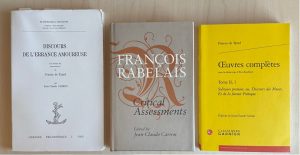
Three of Jean-Claude’s four book-length publications (personal photo)
His articles, book chapters and presentations also reflect the exemplary balance and the unceasing natural curiosity that define Jean-Claude as an individual. His CV is highlighted by pieces on Renaissance Renovatio (cited across this volume), Tyard (of course), Ronsard, Montaigne, Des Périer’s Cymbalum Mundi, early print culture, the history of French cuisine and wine, feminine honor in the Renaissance, etc. – and even some, perhaps (with all apologies to Chris), less sexy subjects such as Théodore de Bèze’s Abraham sacrifiant. Indeed, when I mentioned at SCSC 2012 in Cincinnati that I teach John Calvin’s writings in my “Prose in Renaissance France” seminar, Elisabeth Hodges, whom I had just met, looked up at me from across the dinner table and asked, “Did you study with Jean-Claude Carron or something?” Guilty as charged. All the same, taking the Genevan Reformers seriously, and pointing out the literary value of their writings, is far from the most surprising of Jean-Claude’s many interests. Over his career, he was also a regular with the American Association of Levinassian Studies, did studio recordings with the Getty Research Institute on Henri Chopin and concrete poetry and sat on the advisory board for the International Charles de Bovelles Society. As reflected in Mary McKinley’s contribution to this volume, he was also an avid reader of Robert Walser. Likewise, he and I had several conversations around 19th-century Valaisan novelist Édouard Rod. Once again, with the Reformers, Bovelles, Walser and Rod, one notices to what degree Jean-Claude remains anchored in his Swiss roots. And, this carries over to his teaching, where his “Francophone Europe” course – which celebrated Congolese novelist and his UCLA colleague Alain Mabanckou called “la francophonie blanche” – explores authors from Switzerland, Belgium and the Piedmont/Aosta Valley region of Italy.
Returning to the mentoring relationship with which this memoir-essay begins, when I first came to UCLA in 2003 as a prospective graduate student, I was impressed with the ostensible collegiality of the graduate students there, all of whom seemed genuinely happy in their studies, appeared to fully support one another in their research and had nothing but high praise for the faculty – something I had not seen elsewhere. What I initially dismissed as the result of working daily in the Neo-Romanesque pseudo-cathedral that is Royce Hall, within the open-air museum of UCLA’s campus, in a city where it is 72º and sunny every day, I later realized was due, thanks at least in part, to Jean-Claude’s decade of administrative service as department chair and director of graduate studies across the 1990s. It was a reflection of him and the culture he had built in the French department. To be perfectly honest, I did not come to UCLA intent on working with Jean-Claude; in fact, I had written my MA thesis on Baudelaire and planned to continue with the 19th century for my PhD. However, it did not take long – less than a year, actually – to recognize the attributes that would make Jean-Claude the ideal advisor. If you ask him, his humility would defer to the Renaissance being endlessly interesting. Of course, it is – but, my decision was thanks more to Jean-Claude than it was to the Pléiade. Speaking of Ronsard, Du Bellay and company, following my doctoral dissertation on the Petrarchan sonnet in Renaissance France, it was also Jean-Claude who, in a phone conversation my first year on the job, helped me decide to become a Marot scholar.
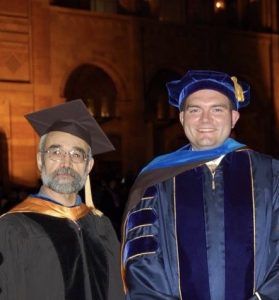
Jean-Claude Carron & Bob Hudson, UCLA Royce Hall
Doctoral Hooding Ceremony, 11 June 2009 (personal photo)
If I harbor a single regret from my graduate studies at UCLA, it is that I never had the opportunity to take Jean-Claude’s seminar “How Tasty Was My Little Frenchman,” which studied Jean de Léry, Montaigne’s “Des Cannibales” and other texts, building to the 1971 Brazilian film that gives the course its title. He had just taught it when I was a prospective student and would not teach it again until after my departure. Jean-Claude officially retired in 2020 but continues to teach emeritus courses at UCLA.
As you might imagine, Jean-Claude has been as exemplary a colleague as he was a mentor. With my doctoral hooding, the only thing that really changed was my permission to now address him as tu rather than the formal vous. Back in Geneva, for SCSC 2009, to celebrate 500 years of John Calvin, Jean-Claude introduced me to both Jeanneret and Francis Higman – two Geneva stalwarts – as well as fellow visiting conference attendees Mary McKinley, Dora Polachek and the late, great Richard Regosin. These early acquaintances in the field continue to line my bibliographies, my e-mail inbox and my memories – not to mention Mary’s beautiful contribution to this volume. At other conferences, he would introduce me to Cynthia Skenazi, Cynthia Brown, Nancy Frelick and several other influential scholars in our field whose work he admires. Then, in 2011, he nominated me to become French Literature track director for the SCSC, a position I held for seven years. Though his conference attendance has slowed, even when not there, as in Bissy at the Tyard conference, for example, Jean-Claude has continued to open doors to me professionally.

Buffalo Trace Distillery, Franfort, KY, KFLC 2015; l-r: Nick Shangler, Scott Francis,
Bob Hudson, Jean-Claude Carron, Jeff Kendrick, Jeff Persels (personal photo)
Returning to SCSC 2012 in Cincinnati, following the conference, Jean-Claude and I shared an adventure I will always treasure, as I rented a car and, together, we headed south across the Ohio to explore the horse farms and coal country of my home state of Kentucky. This trip included a lunch in a diner in Winchester where we met the heiress to Ale 8, the coal elevators of Harlan, the heart of the Hatfield-McCoy feud in Pikeville and a meal shared at the KFC in Col. Harland Sanders’s original Sanders Café in East Corbin. While I cannot recall if this was ever verbalized, I believe it was his first trip to a fast-food restaurant, let alone KFC! Back in LA, I certainly took him to his first baseball game, even though he had lived less than 5 miles from Dodger Stadium in both 1980 and 1988. Expecting a 3.5-hour affair, Jean-Claude was shocked when the Dodgers recorded the final out of a pitchers’ duel in 1 hour, 58 minutes. Jacqueline was even more shocked when we made it back to their house two hours earlier than anticipated(!); but this surprise melted into gratitude when Jean-Claude presented her with the beautiful, rare bird feather he had found at Elysian Park after the game. To me, this was a lovely illustration of their love and friendship.
For the first decade after I finished at UCLA and took my current job at BYU, semi-annual trips to LA to visit my wife’s family were a cherished opportunity to borrow a car, catch a ride or take public transport to visit Jean-Claude. Whether we enjoyed meals at Canter’s Deli, at Farmer’s Market (Gumbo Pot, Loteria) or in Jean-Claude’s home or garden, the conversation and friendship always felt like home. As good as these former staples of the LA restaurant scene were, they simply could not compare to the gastronomical delights of the Carron-Pavlich household. Long-time subscribers to Saveur and other food publications, they often regaled us with their latest recipes, often featuring produce Jean-Claude had cultivated himself. One particularly memorable recipe was a salad made of cubed watermelon, sliced red onions and a vinaigrette; if you are as skeptical as I was that day, let me assure you, it was divine! Another time, on Christmas Eve, Jean-Claude had returned from Switzerland with an upright raclette apparatus he had acquired and, with some bricolage, got it to work at 110 volts using a laptop computer power cord. As he told us that day, “For a man from the Valais, it is very important to racler for one’s friends over the holidays.”
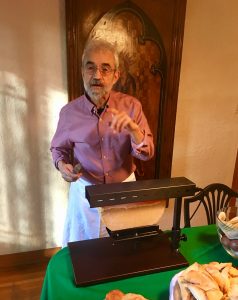
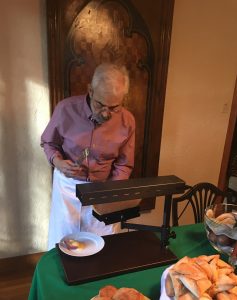
Jean-Claude Carron, Christmas Eve raclette, Carron residence, LA, 24 Dec. 2016 (personal photos)
All the same, the most important recipes Jean-Claude shared with me were those on how to live life fully, to be a meticulous scholar but to enjoy a hobby also, to cultivate your garden (a lesson Voltaire had to learn in Switzerland, too, by the way). His fairly regularly vacations up the California coast, to Humboldt County, where Jacqueline was from, were also recipes for living, and I was always amazed to see their bounteous returns, with French-style cheeses made in hippy communes whose methods are not exactly USDA compliant, unlabeled Sonoma wines from the vignerons they met along the way, caramel-specked cookies from a bakery in Morro Bay that tops each creation with fleur de sel. Again, he was and remains, in every way, exemplary.
As a final anecdote, in the wake of the interest aroused by the documentary Mondovino (2005), Jean-Claude helped organize a UCLA roundtable on the topic of “Wine & Globalization,” featuring wine scholars, producers, vendors and critics. An executive from Robert Mondavi came and donated a pallet of wine. Jean-Claude talked brilliantly about the importance of wine in Tyard (but may have lost most of the audience when he explained Neoplatonic theories of furore). However, everyone there was thoroughly impressed that Jean-Claude managed to bring to campus Joe Coulombe– the Trader Joe(!) – who confessed that he founded Trader Joe’s with the intention of finding good wine that “those who know the difference, literature and humanities professors, could afford.” So, next time you see a bottle of “3-buck Chuck”… What this underlines to me was Jean-Claude’s ability to bring people together in a democratic way to discuss a subject of import and near universal interest.
In 2010, my father passed away, still relatively young, from terminal illness. In 2013, the same fate fell to Jacqueline, also young, also terminally ill. While it would be crass to try to oversell anything related to these two tragedies, I will say unequivocally that having Jean-Claude, my intellectual father, there in times of filial need – for advice, friendly chats over worldwide pandemics or even consolation when France loses on questionable calls in the World Cup final – has been a balm for my still-broken heart. And, for several years now, I still order bourbon balls from Kentucky confectioner Rebecca Ruth to send to him, because I knew Jacqueline adored them.
If nothing else, I hope these paragraphs help paint the portrait – if not the of man, then of the passage – of an exemplary academic career. In the pages that follow, there is no shortage of esteem, friendship and good will held for a most deserving individual and scholar. To you, Jean-Claude, we offer this festschrift in hopes that it will be received in good spirits, among fellow buveurs très illustres, and that it will stand as a testament to one whose example continues to push us upward to passer les cols.
***
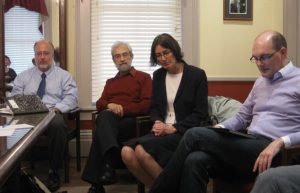
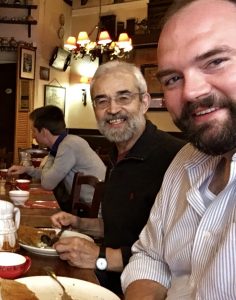
Left: KFLC 2015, Lexington, KY, 24 April 2015, “Remembering Richard Regosin”; l-r: Bruce Hayes, Jean-Claude Carron, Emily Thompson, Marcus Keller (and Elisabeth Hodges, reflected in the mirror). Right: Jean-Claude Carron and Bob Hudson, Crêperie Le Petit Morbihan, Montparnasse, Paris, 11 Aug. 2016 (personal photos)
Leave a Reply
You must be logged in to post a comment.